Grandpa Santa
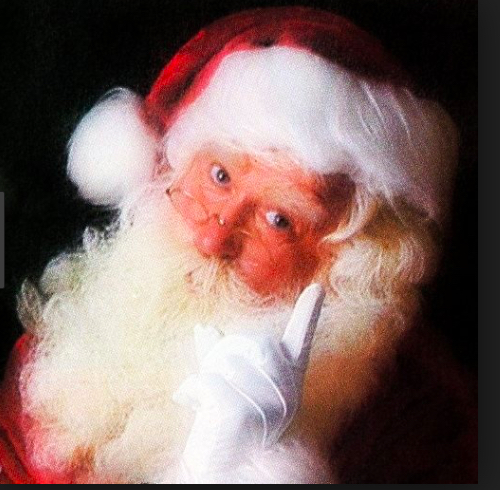
As Christmas approached after my fourth birthday, my grandpa Alphonso told me with great pride that he and Santa Claus (a.k.a. St. Nicolas) were from the same town – Bari, Italy. Grandpa knew I adored Santa. I guess it was obvious to him and everyone else because, beginning the day after Halloween, my other favorite holiday, the costumes for which I always began preparing sometime in July every year, my heart was Santa’s and my love for him displaced all else. It wasn’t just that he gave gifts…it was Santa’s overall goodness that I sensed and loved.
In August of that next year, having successfully evaded the gate-keeping of our Aunt Rose, who could get very cranky when we explored places where children weren’t allowed — my cousins and I found our way into my grandparents’ huge, wondrous walk-in pantry – a treasure chest of a room, filled with a thousand wonders like my grandpa’s Italian army WWI uniform, a WWII civl defense helmet, a jeweled opera sword, an old squeeze box accordion, huge jars of dried mushrooms and herbs, boxes of matzo crackers reserved for when their Jewish friends visited, a stuffed pheasant, hanging provolone, mortadella and prosciutto hams and several plain white containers stacked on shelves. I peeked in one of boxes and there I found the treasure of treasures — yes, Santa’s complete outfit — the red suit, black boots, a full mask with rosy red cheeks and a long white beard. That find, and my grandfather’s and Santa’s resemblance — they both had white hair and mustaches and baritone voices — led to my deduction that Grandpa Alphonso and Santa were, in fact, the same person! Ah, the direct and fantasy-driven logic of child detectives! It was a magical time, that fifth year of my life, for I then knew that my cousins, my sister and I were blessed in a way that differentiated us from all other children, every one of whom, irrespective of station, were much less fortunate than us. We were the grandchildren of Santa himself!
Resisting the temptation to leverage the benefits that might come from being one of the chosen few, I kept that revelation to myself. Fortunately.
That delusion was dashed irretrievably at the next big family Christmas party when, during the distribution of the gifts to all of us kids, I heard Santa speaking with a distinctly higher-pitched, tenor-not-baritone voice, and then recognized my older cousin, Sonny Polet, squeezed into that same suit we had found in the closet. OK…I concluded that Grandpa wasn’t Santa. But, undaunted, I kept alive the more important delusion, about the real Santa’s existence. I live on hope.
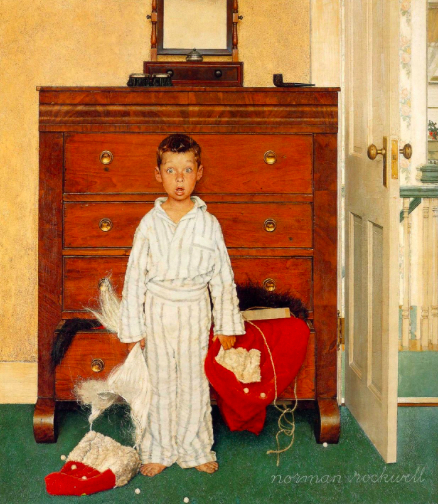
Just as I gradually learned that the world wasn’t confined — to the small communities within which I played, the Mount Virgin church where our family worshipped, or the Italian market on the corner where we purchased our groceries — Seattle wasn’t a big town back then — the illogic of a perpetually and annually appearing Santa, eventually penetrated through the fuzziness of it all, along with the improbability of the many benevolent miracles we were told he performed each December.
The final dissolution of my complete faith in Santa didn’t come on like an epiphany, however. It was a painful process, that letting go, and I obstinately held on to my belief in his existence as long as I could, preferring to sacrifice my other cherished beliefs in superheroes instead, one by one — first the Easter Bunny, then Superman and other mythical beings. Walt Disney (he wasn’t a real person either, right?) was last to go before Santa, because I thought Walt too, just like Alphonso, somewhat resembled Santa Claus — he seemed so gentle and kind — and he gave great gifts for free on TV, like cartoons and Annette Funicello. So for a brief while, maybe a day or two, I held on to the hope that there might be a connection that would prove Santa really existed and Old Walt might really be HIM.
I would have to admit that my thought process back then was mired in what is now clinically defined as an “anchored bias.” I stubbornly countered and argued down each logical fact – presented by the cynical faithless sneering ones in my kindergarten class, the children of progressive parents who thought it better to tell the truth to their pre-school kids than give them myths to dream on – with yet another really compelling, albeit illogical myth I learned about Santa, my beloved, ageless, morbidly obese, red-suited mentsch of a man who survived the coldness of the North Pole, maintained his corpulence by eating an endless supply of cookies and drank huge quantities of curdled milk left out over night by well-meaning kids, never slept, visited without incident but with the help of time zones, every house (chimney or no chimney) in the world in one night, always laughed despite his lack of sleep, and somehow knew in the same omniscient way as Jesus did just what I was thinking and doing.
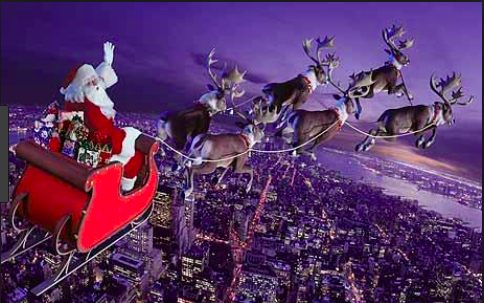
It was the Decameron-esque miracle story I heard one year later when I was five and a half years old – from my grandfather, actually, that pushed me forever into the ranks of the Santa-apostates. There are many versions of this story. The way my grandpa told it was goes something like this: Getty [Grandpa’s Italian pronunciation of “Gary”, his nickname for me] You know that Santa is the patron saint of little children? Yes? It is because one day [@ 300 A.D.] when he was then just Nicolas and not yet a saint but rather a mere bishop [in Ancyra Turkey] he happened upon a butcher’s shop that was doing a brisk brisket business and selling prosciutto, brasiola-carpaccio, copa-colla and other meat delicacies. Nicolas was a smart man and became somewhat suspicious – because, after all, everyone else was starving from one of the regions’ many long-lasting famines. Because the butcher liked to be considered to be a generous fellow, Nicolas was able to convince the man he should allow a blessing to be bestowed on his shop and its products. The butcher, not understanding the power of this saint-to-be, consented to let Nicolas see the meat curing in salt tubs in the back room. Nicolas said a prayer and sprinkled some holy water on the meat. No sooner did he do that, then what do you think happened?… the sliced-meat turned back into happy, playful little children! And thus, the long-standing mystery of the missing children of the region was finally solved, Nicolas returned the children to their parents’ homes, the butcher converted to Christianity, Nicolas was canonized, and everybody was happy after that. Amen.
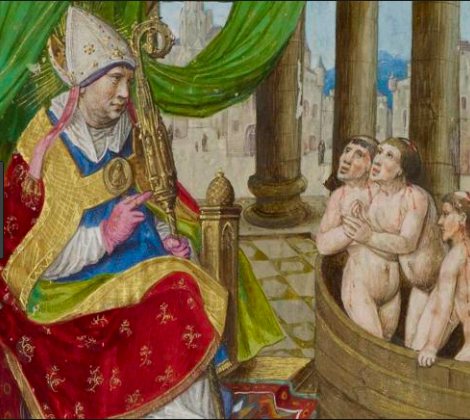
Master of the Lübeck Bible, Saint Nicholas Rescues Three Youths From a Tub from the Spinola Hours (Ms. Ludwig IX 18, fol. 261v), 1510-1520, tempera colors and gold leaf on parchment. The Getty Center, The J. Paul Getty Museum, Los Angeles
When I heard that story, I could no longer hold on to my fantasy. It was just too sudden an introduction to certain realities – too macabre a tale to fit into the notions I had about the benign, innocent world of the Santa. The terms “naughty” and “nice” could no longer define the boundaries what I realized was really out there in a much bigger world. At that moment, Santa became Nicolas again — a realist, who understood that some men do evil things and that sadness is often an unfortunate condition of our existence. Horror and cruelty existed and even victimized kids.
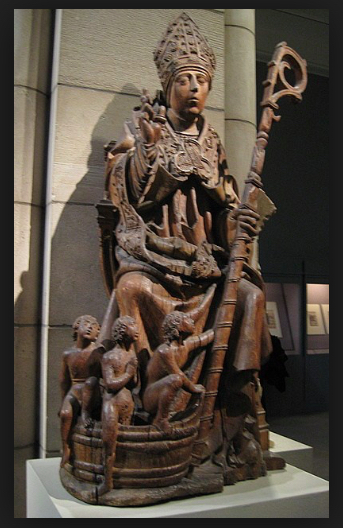
St. Nicolas saving the children from the butcher – Metropolitan Museum of New York
So now, so many years later, I am happy that many of us have re-found St. Nicolas and we can leave the constantly evolving fairy-tale Santa to the Coca Cola ads. Thanks to the advertising industry, the Santa I believed in back then as a child seems irreversibly associated now with getting something for nothing other than maintaining a slippery notion of “goodness” and “badness.” And that, I realize, is just where the cynics figured out a way to push their way in — to get us to buy their stuff. It is a unfortunate transformation — the sullying and destruction of innocence via by the not-so-subtle provocation of greed, is it not?
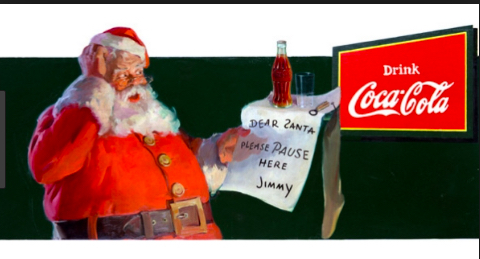
The tale of Nicolas and the butcher is a wonderful, horrifying metaphor that, years later, I understood told of one ordinary man’s extraordinary, determined resistance to evil. The real Nicolas was given the honor of sainthood because, despite any shortcomings he may have had, he found ways to deal with those realities, without he benefit of miracles, but rather with persistently arduous, resourceful labor dedicated to the betterment of mankind. And, given all the temptations around us, and all conveniences we employ to ignore true evil out there, that persistent dedication is the real miracle, isn’t it?

We have to live with the cynics and the butchers, just as we do with the Christmas ads and jingles that merchants trot out well before Thanksgiving. So – and this advice is to those of us who believe in telling their children the truth — let us remember that, fortunately, saints do exist as well.
Loved this Cousin Gar! Beautifully expressed – brings back so many memories of the big house, Auntie Rosie and the pantry with anything you could ever want! My dad, Uncle Guy to everyone in the family, was the Santa Claus every year at the Italian Club Christmas party held at Pigott Auditorium at Seattle University. As I was growing up, I could never understand why my Dad would be there for the party but somehow always have something to do when Santa arrived. Although I don’t remember what age I was, I do remember the precise moment that I sat on Santa’s lap and looked down at his shoes, and recognized that they were indeed, my Dad’s exact pair. As you said, it is a painful process of letting go. Sending Christmas blessings to you and your family!
Beautifully told story Cousin Gar! Brings back so many memories of the Big House, Auntie Rosie and that mysterious pantry. My Dad, Uncle Guy to everyone in the family was the Santa Claus every year for the Italian Club Christmas Party held at Pigott Auditorium at Seattle University. Each year, I was always disappointed when Daddy would remember something that had to be done and would leave, right before Santa arrived. Although I don’t remember my age, I do remember the precise moment when I looked down at Santa’s shoes and recognized them as looking exactly like my Dad’s. As you said, its a painful process of letting go. Sending Christmas Blessings to you and your whole family. Love, Rosemarie
thank you, Rosemarie. That is so funny and touching about our beloved, sweet Uncle/Poppa Guy! Blessings to you and your family. Love, Gar
Gar—What a beautiful story and beautifully told! Jim George
Gar- we know you as a wonderful storyteller but I am learning how you also inspire storytelling in others, Geoff
Geoff: You started it, ol’ Friend. Your blogs are a gift.